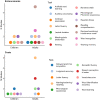Bilingual disadvantages are systematically compensated by bilingual advantages across tasks and populations
- PMID: 38267616
- PMCID: PMC10808122
- DOI: 10.1038/s41598-024-52417-5
Bilingual disadvantages are systematically compensated by bilingual advantages across tasks and populations
Abstract
Bilingualism is linked to both enhanced and hampered performance in various cognitive measures, yet the extent to which these bilingual advantages and disadvantages co-occur is unclear. To address this gap, we perform a systematic review and two quantitative analyses. First, we analyze results from 39 studies, obtained through the PRISMA method. Less than 50% of the studies that show up as results for the term "bilingual disadvantage" report exclusively a disadvantage, that shows bilinguals performing worse than monolinguals in a task. A Bayesian analysis reveals robust evidence for bilingual effects, but no evidence for differences in the proportion of advantages and disadvantages, suggesting that when results from different cognitive domains such as executive functions and verbal fluency are analyzed together, bilingual effects amount to a zero-sum game. This finding was replicated by repeating the analysis, using the datasets of two recent meta-analyses. We propose that the equilibrium we observe between positive and negative outcomes may not be accidental. Contrary to widespread belief, advantageous and disadvantageous effects are not stand-alone outcomes in free variation. We reframe them as the connatural components of a dynamic trade-off, whereby enhanced performance in one cognitive measure is offset by an incurred cost in another domain.
© 2024. The Author(s).
Conflict of interest statement
The authors declare no competing interests.
Figures







Similar articles
-
The Bilingual Switching Advantage: Sometimes Related to Bilingual Proficiency, Sometimes Not.J Int Neuropsychol Soc. 2015 Aug;21(7):531-44. doi: 10.1017/S1355617715000521. J Int Neuropsychol Soc. 2015. PMID: 26527242
-
Age-related effect on language control and executive control in bilingual and monolingual speakers: Behavioral and electrophysiological evidence.Neuropsychologia. 2020 Feb 17;138:107336. doi: 10.1016/j.neuropsychologia.2020.107336. Epub 2020 Jan 8. Neuropsychologia. 2020. PMID: 31923527
-
Specific language impairment in language-minority children from low-income families.Int J Lang Commun Disord. 2014 Nov;49(6):736-47. doi: 10.1111/1460-6984.12107. Epub 2014 Sep 11. Int J Lang Commun Disord. 2014. PMID: 25209889
-
Is bilingualism associated with enhanced executive functioning in adults? A meta-analytic review.Psychol Bull. 2018 Apr;144(4):394-425. doi: 10.1037/bul0000142. Epub 2018 Mar 1. Psychol Bull. 2018. PMID: 29494195 Review.
-
Meta-Analysis Reveals a Bilingual Advantage That Is Dependent on Task and Age.Front Psychol. 2020 Jul 24;11:1458. doi: 10.3389/fpsyg.2020.01458. eCollection 2020. Front Psychol. 2020. PMID: 32793026 Free PMC article.
Cited by
-
Thinking about numbers in different tongues: An overview of the influences of multilingualism on numerical and mathematical competencies.Psychol Res. 2024 Nov;88(8):2416-2431. doi: 10.1007/s00426-024-01997-y. Epub 2024 Jul 26. Psychol Res. 2024. PMID: 39060519 Review.
References
-
- Bialystok E. Bilingualism in Development: Language, Literacy, and Cognition. CUP; 2001.
-
- Bialystok E. Cognitive effects of bilingualism: How linguistic experience leads to cognitive change. Int. J. Biling. Educ. 2007;10(3):210–223. doi: 10.2167/beb441.0. - DOI
Grants and funding
LinkOut - more resources
Full Text Sources
Miscellaneous

